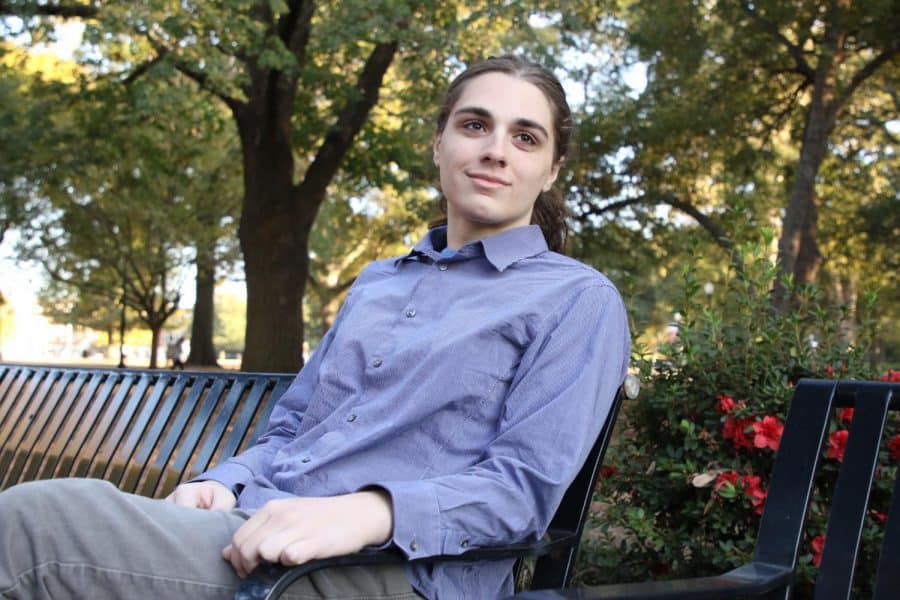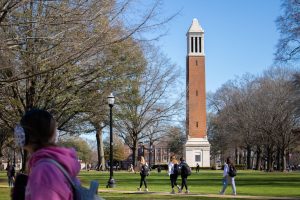Alabama health care fails transgender students
November 29, 2018
Cameron McCall isn’t much of a football fan, which is probably for the best, since she had to miss out on the Alabama vs. Citadel game a couple weeks ago. Instead of hiking up the spiral at Bryant-Denny Stadium, the junior majoring in biology was making a more than three-hour drive to Nashville, Tennessee to see her doctor.
McCall, who was assigned male at birth, has been undergoing hormone replacement therapy to affirm her gender for more than a year. The therapy, sometimes called feminizing and masculinizing hormones, helps transgender individuals transition away from being visibly transgender. The doctor nearest to Tuscaloosa is about an hour away in Birmingham, but McCall stopped seeing him after being asked intrusive questions while at his office and feeling pressured into taking a prescription for pre-exposure prophylaxis (PrEP), an HIV prevention treatment.
“He’s not that great of a person to see,” McCall said. “I’ve had some negative experiences with him, as have some of my friends.”
Outside of Birmingham, the Nashville Planned Parenthood is the closest place to get the hormone therapy necessary to physically transition, McCall said. There are a few offices in Atlanta, but Nashville came highly recommended from her friends.
The University of Alabama at Birmingham also has gender-transitioning services with the ability to prescribe gender-confirming hormones, but McCall said it’s difficult to get an appointment.
“I get conflicting answers when I ask people. I’ve heard you need to be a UAB student and I’ve heard you just need a referral,” McCall said. An employee at UAB Student Health Services confirmed that its services are only available to UAB students. UAB also has an LGBTQ Mental Health and Wellness Clinic, which does not prescribe gender-affirming hormones.
Gender-confirming hormone treatment is necessary to maintain a high quality of life for most transgender individuals, particularly for transgender women, according to a 2016 joint study published in Transgender Health. The study also noted that hormone replacement therapy (HRT) can be one of the few ways to effectively alleviate the “psychological distress” caused by gender dysphoria. In 2011, the American Medical Association issued a health policy encouraging researchers to investigate the long-term effects of HRT in transgender patients.
In the 2016 article “Should Psychiatrists Prescribe Gender-Affirming Hormone Therapy to Transgender Adolescents?” published in the AMA Journal of Ethics, medical student Rachel Jackson and physician Cary Crall noted that HRT is “a safe and effective way to improve quality of life and mental health outcomes for transgender adolescents.” The duo also concluded that therapists should be willing to prescribe gender-affirming treatments for transgender patients and work towards expanding the availability of proper transgender health care.
Because HRT is one way for a transgender person to alter their physical characteristics, it is often crucial when trying to avoid looking transgender, often called passing. Passing as a woman is something that was often on McCall’s mind when she began to transition.
“It’s just sort of a scary thing, because you’re never quite sure of how well you pass as your identified gender,” McCall said. “I haven’t had too much trouble with things, aside from a couple of stares early on. I still get a little bit scared whenever I use the women’s restroom.”
For the Tuscaloosa transgender community, that availability is still lacking.
Jade Teel, a junior majoring in religious studies and history, is still working with the UA counseling center to get his HRT letter, which acts as a referral from a therapist to a physician and recommends that the physician prescribe HRT. Teel agrees that finding adequate, transgender-friendly health care in Alabama is difficult.
“There aren’t any HRT places in Tuscaloosa, and the closest places are in Birmingham and Nashville,” Teel said. “I’ve heard that the Birmingham place can be helpful, but it’s still difficult because of people’s perceptions of the trans community, unfortunately.”
Issues with locating adequate transgender health care are not limited to Tuscaloosa. In a 2018 study published in Transgender Health, researchers found that many New Orleans-based transgender and genderqueer respondents dealt with discrimination and financial obstacles while searching for health care, with one subject describing health care as an anxiety-inducing “black hole.” Some of their subjects felt forced to self-medicate in order to avoid the exorbitant pricing and mistreatment they encountered when dealing with health professionals.
But according to Teel, transgender students at the University of Alabama won’t let health care issues get in the way of forging community. Teel takes advantage of some of the resources from the student counseling center, citing a transgender support group where he has met some friends. McCall describes herself as pretty social, but also said that the Safe Zone lounge, located in the Ferguson Student Center, and Spectrum are helpful resources for those looking to find a queer community.
Inclusion on campus is still an issue, Abby Reed, a former UA nursing student, said. Although Reed is cisgender, meaning that she identifies with the gender assigned to her at birth, she says that the University has the opportunity to become more inclusive towards transgender and gender-nonconforming students.
“If the University became more inclusive, meaning gender-neutral bathrooms and bringing awareness to the importance of proper pronoun usage and respect, it would make the campus community – as a whole – much stronger,” Reed said.










